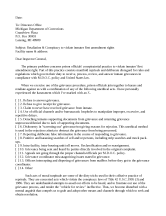
Broader Impact of prisoners' legal work
Revolutionary greetings of love, dedication and resiliency to all freedom fighters and fearless front line generals, soldiers and warriors who dare to struggle and sacrifice for liberty, freedom and equality from behind the walls, fences and cages of genocide and oppression. As we continue to raise awareness and lift up our voices so that we may be heard on the issues of systematic racism and economic exploitation in the criminal justice system, as well as prison slavery, police killings and brutality. We continue to see an evil and determined enemy dig in its heels in the name of white supremacy.
I am a Missouri prisoner who has been imprisoned for 32 years. I am educated with a paralegal degree. With my credentials, I have a legal clinic of 10 comrades. We have taken it upon ourselves to do separate booklets of individual civil complaints such as: censorship, religion, cruel and unusual punishment (prison conditions) etc. We will be sending those to MIM(Prisons) upon their completion. We have made censorship our first priority, and already sent this one in to MIM(Prisons).
However, we only have an ex-amount of time in the law library, so we have to copy case-law (hundreds of them) and take them back to our cells and work on our booklets. Our resources are limited and we need help! So if any of my comrades know of places that will send “unlimited” printed caselaw to us, please contact MIM to pass the message on.
MIM(Prisons) responds: These comrades are setting an example of how to make your work impact more than just one persyn. Many can benefit from concise information on how to fight specific legal battles. The first guide created by this group, fighting censorship, is a good example of this as it ties directly into a problem that the revolutionary movement behind bars faces regularly – the censorship of our literature. Under Lock & Key and other lit that we send in is often rejected and our only recourse is grievances and legal challenges. Because of the critical role that revolutionary education plays in our organizing work, we prioritize this legal battle. And we distribute a censorship guide to all who have our lit rejected.
We have a few cautionary notes to those working on this legal project and others who are interested in taking up similar legal work. First, there are many guides already out there for prisoners, so anyone putting time into this type of project needs to start by making sure you’re not duplicating work.
Second, as with our anti-censorship work, it’s important that we tie our legal work to our revolutionary organizing. There are many legal battles that prisoners are fighting, but these can be a distraction from the larger struggle if we don’t tie them to the reality that the legal system isn’t going to make real or substantive change for us. We might win a few censorship battles, but we’ll never effectively stop censorship through the imperialist courts. We use the censorship struggle to highlight the hypocrisy of imperialism and underscore their fear of revolutionary education, while making some room for us to reach people with politics.
We need to be organizing people to use legal battles as a part of the larger campaigns that the movement prioritizes. We can attempt to use the courts to our advantage, but our goal in the long run is to dismantle the imperialist courts and replace them with a system of people’s justice.








